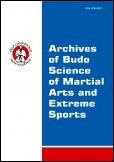2022, Volume 18, Issue 1
Dr Waldemar Sikorski (1937-2022) and his concept of supporting judo practice through science
Roman Maciej Kalina1, Artur Kruszewski2, Hiromi Tomita Nishii3, Antoni Zajkowski4
1Editor-in-Chief Archives of Budo, Warsaw, Poland
2Department of Individual Sports, Jozef Pilsudski University of Physical Education in Warsaw, Warsaw, Poland
3Universidad de Puerto Rico Rio Piedras, Educacion Fisica, Puerto Rico | Graduated of the Jozef Pilsudski University of Physical Education in Warsaw, Warsaw, Poland
4First Polish Judo Olympic Medallist, , Poland
Author for correspondence: Artur Kruszewski; Department of Individual Sports, Jozef Pilsudski University of Physical Education in Warsaw, Warsaw, Poland; email: artur.kruszewski@awf.edu.pl
Full text
Abstract
Waldemar Sikorski was one of four men who, in the summer of 2005, decided that Archives of Budo would be an appropriate title for a journal dedicated to the health aspects of combat sports and martial arts. Five months later (from the beginning a member of the Editorial Board) he publishes his first article in the first volume of Archives of Budo: “Changing judo in changing Europe on the identity of combat sports in the era of integration on globalisation”. His lifelong passion – judo – began with practice. He was a competitor of AZS AWF Warsaw in 1959-1964 and represented Poland in international matches. He was a coach at AZS AWF Warsaw (1963-1967), coach of the senior national team, co-author (with Hiromi Tomita) of the first Olympic medal (silver) won by Antoni Zajkowski at the Munich 1972 Olympic Games. He was prepared for this mission in a special way – he had graduated the Jozef Pilsudski University of Physical Education in Warsaw and English Philology at the University of Warsaw. The authors of review of the Dr Waldemar Sikorski's life achievements from the perspective of exploring judo in the broad context of philosophy, theory and practice, are linked to him by various relations of a particular dialogue between two geographically distant cultures, which, paradoxically in a way, started at the level of judo. There is no evidence that the two eminent creators of new knowledge at the turn of the 20th century, Jigoro Kano and Tadeusz Kotarbinski, cited each other's works, yet each of them solved the same issue in their own way. The founder of judo, Jigoro Kano, emphasised that the most important thing is having "judo in mind", while the founder of modern praxeology, Tadeusz Kotarbinski, said that it is not only about making an action effective, but also morally irreproachable. Dr Waldemar Sikorski (7 dan judo) understood these principles, realised them in his creative life and left material evidence – scientific, popular and methodical works.
Key words: health aspects of martial arts, judo in mind, praxeology





